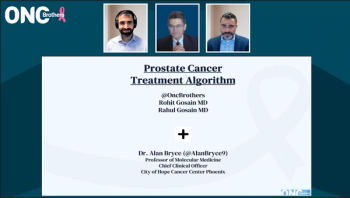
Experts discuss how to decide which robotic prostatectomy (RP) approach to utilize, considering factors such as patient characteristics, surgical outcomes, and the latest clinical evidence.

Your AI-Trained Oncology Knowledge Connection!


Experts discuss how to decide which robotic prostatectomy (RP) approach to utilize, considering factors such as patient characteristics, surgical outcomes, and the latest clinical evidence.

Experts discuss the role of PARP inhibitors in prostate cancer treatment, exploring their mechanisms, clinical benefits, and how they fit into current therapeutic strategies.

Experts discuss considerations for other androgen receptor inhibitors, highlighting their role in treatment strategies and how they impact patient outcomes in prostate cancer.

Experts give an overview of the treatment landscape in prostate cancer as of 2025.

Key opinion leaders in the field of prostate cancer close out their discussion by sharing excitement for future evolutions in the setting of hormone-sensitive disease management.

Expert panelists consider the possibility of taking a break from treatment given a patient’s response to therapy along with other unique management strategies in the setting of metastatic hormone-sensitive prostate cancer.

In a third clinical scenario of metastatic hormone-sensitive prostate cancer, panelists discuss oligometastatic disease, radiation therapy, and the potential role for PSMA-PET scans.

Centering focus on a second clinical scenario of metastatic hormone-sensitive prostate cancer, key opinion leaders identify treatment options based on variations in presentation.

Shared insight on strategies to monitor patient response to therapy and select second-line treatment when hormone-sensitive prostate cancer progresses.

After nuancing quality of life data with chemotherapy in metastatic hormone-sensitive prostate cancer, panelists consider the value of multidisciplinary care.

Focused discussion on the respective roles of doublet and triplet regimens in patients newly diagnosed with metastatic hormone-sensitive prostate cancer.

Panelists reflect on molecular markers and other clinical factors that aid in the selection of best therapy for a patient with metastatic hormone-sensitive prostate cancer.

Key opinion leaders in the field of prostate cancer management consider optimal molecular testing practices in a patient with metastatic hormone-sensitive disease.

ONCOLOGY® editorial board member E. David Crawford, MD, and colleagues, propose a new model for guiding the treatment of prostate cancer that focuses on a “transitional state,” which occurs during the interval of progression to metastatic castration-resistant prostate cancer.

Published: April 28th 2023 | Updated:

Published: May 5th 2023 | Updated:

Published: May 19th 2023 | Updated:

Published: May 12th 2023 | Updated:

Published: April 19th 2021 | Updated:

Published: May 26th 2023 | Updated: